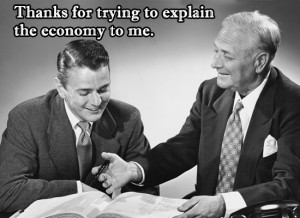AAA
 Luxembourg is hanging onto its triple-A rating by the skin of its teeth. A string of the “well-to-do” nations in Europe wake up every Monday nowadays dreading the much-feared Standard & Poors downgrade from AAA to AA. Many still live in the land of make believe where they think that a downgrade is nigh impossible – even if the once mighty United States has already taken the punch. The national press here in the Duchy reported Ministerial songs of austerity and budget restrictions a week or so ago but there still seems to be an air of “this will never happen to us”. North of the border Elio di Rupo becomes Brussels first francophone Prime Minister since 1974 and has a government of 12 Ministers and 6 Secretaries formed just in time for the upcoming Treaty negotiations.
Luxembourg is hanging onto its triple-A rating by the skin of its teeth. A string of the “well-to-do” nations in Europe wake up every Monday nowadays dreading the much-feared Standard & Poors downgrade from AAA to AA. Many still live in the land of make believe where they think that a downgrade is nigh impossible – even if the once mighty United States has already taken the punch. The national press here in the Duchy reported Ministerial songs of austerity and budget restrictions a week or so ago but there still seems to be an air of “this will never happen to us”. North of the border Elio di Rupo becomes Brussels first francophone Prime Minister since 1974 and has a government of 12 Ministers and 6 Secretaries formed just in time for the upcoming Treaty negotiations.
What Treaty negotiations I hear you ask? Well it seems that the Merkozy duumvirate is pressing for a revised Treaty by March next year. March. That’s “only” three months away. I say only because it’s a treaty rewriting we are talking about – one that usually requires months and months of horse-trading and negotiations. Merkozy will not have that. They need a Treaty Change and they need it now. “Change is…” that’s Barack Obama’s new battle-cry. In this case “Change” is an attempt at avoiding what Radek Sikorski called “disintegration” in his now famous speech in Berlin on the 28th November.
“the entire practice of lending money presupposed at least the honest intention to repay”
Sikorski’s speech made waves and it did so because it called a spade a spade. Here he is exposing the problems of the Euro zone’s failings:
We have a Europe with a dominant currency but no single Treasury to enforce it. We have joint borders without a common migration policy. We are supposed to have a common foreign policy, but it is divorced from real instruments of power and often weakened by member states cutting their own deals. I could go on. Most of our institutions and procedures depend on the goodwill and sense of propriety of member states. It works tolerably well when the going is good. But then a wave of migrants shows up on the EU’s border, or a civil war blows up in our neighborhood, or markets panic. And then, what do we habitually do? We run for cover in the familiar framework of the nation state.
The nation state. That’s what we were saying a while back about new republics. Not Joseph Muscat’s sudden flirt with ideas about “Second Republics” – verbal contracts, not worth the paper that they are written on. The nation state in its revised form takes note of the realities within which it operates and accounts for them. Sikorski refers to the early hiccups in the US federation and in the Swiss federation. I recall ten to fifteen years ago during our European Studies when the “deepening vs widening” question was very much the vogue. Our biggest question then was when we asked what it would take for the big step towards federative structures to take place. Sikorski gave us the answer.
It’s the economy, stupid.








May we be missing some of the historical irony in the euro saga? Raw capitalism led to the depression of the 30’s that led to the rise of economic common sense underpinned by dictatorships that by their very nature were self- imploding. At the crucial moment Malta chose the ‘right’ side (not so much out of choice but out of the political realities at the time). As long as Communism counterbalanced capitalism, the latter had a decent face. Post fall of Communism, the capitalist impulse came back with a vengeance ignoring the lessons of the 30’s. This time round those who would have also chosen the ‘wrong side’ in the 30’s and other people of good will who missed the point that the Euro was a political not an economic choice, chose the wrong side.
Is this being wise after the event? I will not quote Alfred Sant or KMB but an unlikely bed-fellow:
1. If you combine a single system centralized decision making ,a culture of secrecy and the elimination of genuine debate, one can hardly complain at the ensuing graft and incompetence
2. The European Single currency is bound to fail, economically, politically and indeed socially…this failure cannot be rectified by international attempts to rescue the Euro, because the fundamentals of euro-land are irremediably unsound…the most important priority for the non-Europeans is to see the European policies do as little harm as possible now or later to the world economy. (MT 2002, yes 2002). No wonder that ‘who killed RC’ makes a comeback in the land of make-believe.